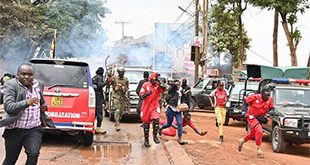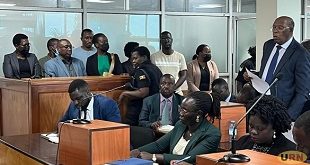
By Patrick Kagenda
As the Uganda Police Force (UPF) ended its centenary celebrations on Oct.3 with a colourful gala parade at the Kololo Ceremonial Grounds in Kampala, all eyes were on the years ahead. The police celebrations were held under the theme, `From colonial policing to community policing: a century of challenges, achievements and transformation’. The Kololo celebrations were the culmination of six months of activities.
The chief guest at the event, President Yoweri Museveni handed over the police torch to the IGP to light the way for “community policing” which is the future of police.
Museveni outlined his vision of the future of the police when he promised to continue providing the force with more equipment “to fight groups that have been disturbing general order”.
He launched the Centenary Plaque whose purpose is to ensure community policing is carried out 24/7.
Community policing involves a partnership between the police and the community to prevent and fight crime.
Museveni promised to help the police recruit more personnel to attain the international ratio of one policeman/woman for every 500 people.
The UPF currently has 45,000 personnel; which is a ratio of 1:1500. That is a low figure but the Minister of Internal Affairs, Gen. Aronda Nyakairima who oversees the UPF, said it is impressive considering the status in 1986 when the current government came to power. He said the UPF today is better trained, has better equipment, leadership, and young educated people.
Museveni praised the police for becoming a productive force following its establishment of a factory to produce its own uniforms and those of other security agencies.
On the issue of the police welfare, Museveni called on the police to adopt collective solutions.
“These solutions solve problems. We did it with the UPDF by building primary and secondary schools in barracks for the soldier’s children and we are now looking at finding ways of how children can get university tuition loans so that their parents can pay slowly,” he said.
Museveni repeated his promise of helping the families of police officers that were ruined by past governments.
Basing on speeches by Museveni and others, it appears the UPF will operate under the community policing model and have its centenary flag that will fly side by side with the Uganda police flag at all police installations.
Earlier, the chief host at the celebrations, IGP Gen Kale Kayihura, said Oct.3 needed to be declared the National Police Day.
Gen. Kayihura who has been at the helm of the police since 2005 became emotional and confessed his belief in God although he is not a regular church-goer. He asked for a Christian anthem; “Amazing Grace” to be played because, he said, it reminds him of the tribulations he has gone through.
He said the achievements of police have surprised even President Museveni who appointed him.
“When I joined you looked at me as a non-starter but I have proved to be a value addition. I have given my all to the assignment of building a police force that is respectable,” he said.
Kayihura hailed his predecessors; both living and past, for what they did to start the journey to transformation.
“I have tried to build on the transformation journey they started,” he said.
Kayihura said they, as Uganda Police Force, were proud of what has been achieved. He said this is reflected in the enthusiasm of the youth, and especially women, flocking to join the force saying the current intake of cadets has many professionals.
The UPF traces its origins to the Uganda Protectorate Police which was formed in 1906 and the centenary celebration should have been marked eight years ago but were delayed for various reasons.
Highlights of the celebratory activities included the John Akii-bua Memorial Marathon in May that raised awareness about acid attacks. John Akii-bua, who was a policeman, was the first Ugandan ever to win the country a gold medal in the 1972 world Olympic Games.
The centenary activities included the police image rectification campaign, rolling out the community policing model, welfare of personnel both serving and retired, the Erinayo Oryema memorial public lecture, the re-burial of Uganda’s first African IGP, Lt. Col. Erinayo Oryema, who was murdered during the regime of President Idi Amin, numerous crime preventers’ recruitment drives, and community service events across the country.
A total of 16 police delegations and police affiliate delegations attended the celebrations. They included delegations from Nigeria, Namibia, Kenya, Tanzania, South Sudan, Somalia, Comoro, Djibouti, Algeria, DRC, Egypt, Malawi, Swaziland, Sudan, the African Union and INTERPOL.
Kenya`s IGP David Kimayo who is the chairman of the Eastern Africa Police Chiefs Cooperation Organization (EAPCCO) and the IGP of the Namibia Police Force, Lt. Col. Saitota Naitunga, spoke at the event. Both spoke of the need for united force to fight trans-border crime.
“African countries police forces will stand together to find solutions to African problems,” said Saitota.
The UPF also has partnerships with Turkey, UK, Germany, DPRK, India, and China. Kayihura said all have helped in the building of a modern police force.
At the Kololo event, President Museveni was awarded and decorated with the Uganda Police Force`s top medal the ‘Commander in Chief’ medal. The police awards and decorations are a new development in the police force. They only came into effect recently, on Sept.29, following the signing of an instrument No. 3 (III) of the National Honours and Awards Act.
A total of 1,456 people were nominated for different awards and only 31 were awarded at Kololo. Gen Kale Kayihura and former IGPs John Cossy Odomel and the late Lt. Col. Erinayo Oryema were awarded the `Exemplary Service Medal Class One’. Conspicuously, Gen Katumba Wamala, who preceded Kayihura was not awarded.
Others who received the Exemplary Service Award Medal Class One were Gen. Aronda Nyakairima; the minister of Internal Affairs and the Minister of State for Internal Affairs, James Baba.
 The Independent Uganda: You get the Truth we Pay the Price
The Independent Uganda: You get the Truth we Pay the Price


